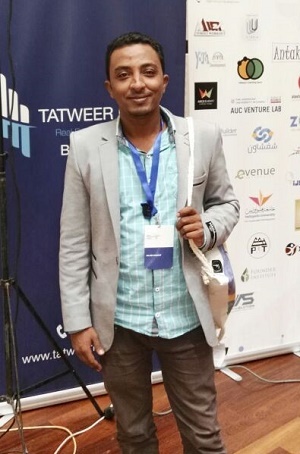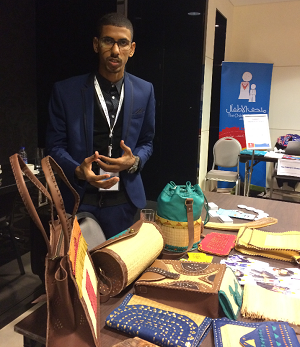Fixing Egypt’s waste crisis one handbag at a time

An Egyptian startup in Aswan is turning palm tree waste into handmade products, and is not only providing jobs but helping to revive traditional Nubian cultural traditions in the process.
In 2013, Isslam Yassen was working with an Aswan NGO called Al Misr Al Gesr for Media and Development to develop agricultural projects in his hometown. He was mainly working with farmers and projects involving palm trees, which was when he learned just how catastrophic the traditional way to manage palm tree waste was on the environment.
By the end of 2014 Yassen had conceived of and launched Napata (which means 'plant' in English), a startup making fabrics from palm fronds, which was then used to make environmentally-friendly handmade products such as handbags, rugs, computer mouse pads and tablet covers sold through the Napata website and outlets in Cairo.
Napata is not the only company working in this field.
Jozour from Cairo is turning palm fronds into durable wood products, as do Dawayer and Jereed, which operates in Upper Egypt. In Aswan Nakhla is making low-cost furniture from the same material, and in 2015 the Palm Tree Project was trying to get a business similar to Napata’s off the ground.
Celebrating Nubian culture
Yassen told Wamda he spent 150,000 Egyptian pounds of his own money (about US$21,000) to kick-start Napata, and the products reflected the local Nubian culture.

In the last three months alone his 20 employees - all Nubian women - had produced 600 products with prices, for handbags for example, ranging between 340-600 pounds (US$18-31).
"It was a dream to solve such an environmental issue on one hand, and to create new job opportunities on the other hand for young people in Aswan. Job opportunities became rare in Aswan after the tourism sector was terribly hit by the unrest that followed the January 25 Revolution," the 33-year-old entrepreneur said.
Aswan’s waste, jobs crisis
Aswan, some 680km south of Cairo, is famous for its tourist sites and many who live in the city work in the tourism sector. But following the revolution in 2011, many found themselves jobless as the tourist trade dried up.
The tourism industry has been on a rapid decline since then. Tourism revenue fell by 41 percent from $10 billion in 2012 to $5.9 billion in 2013, according to Ministry of Tourism data. This year state statistics agency CAPMAS said Egypt received only 2.3 million tourists in the first half of 2016, down 51.2 percent from the same period last year.
A lack of tourism isn’t their only problem. According to waste management expert and Cleantech Arabia founder Ahmed Huzayyin, Aswan has 1.8 million palm trees.
"There are about 105,000 tonnes of waste coming out of palm trees in Aswan," Huzayyin said. "Napata comes as a partial solution to the environmental hazards of burning palm waste in Aswan, but it still can not solve the whole palm waste burning problem.”
In Egypt date palms can create up to 20 kilograms of dry leaves a lone each year, but also produce byproducts including date pits, seeds and stems, according to waste management consultancy Bio-Energy Consult. Almost all of this is burned or dumped in landfills.
Truly ‘local content’
Napata marketing director Mostafa Farag told Wamda they expected to double the number of products they produced in 2017, thanks to growing the team to 20 employees.

hand-made bags, made from palm frond fabrics
and natural leather.
“The women were hired in cooperation with [the NGO Al Misr Al Gesr for Media and Development] that runs a number of social initiatives. Twenty out of 200 women [wanted] to get the training at the beginning. After they became well trained and saw the outcome of the products, they were willing to continue,” he said.
Jihan Saad, 42, is one of the early trainees having joined two years ago. She is a housewife, has two sons, and is illiterate, and she wanted to increase her income so she decided to join Napata.
“I learned how to design bags from the fabrics out of palm fronds after getting fully trained... and increased my income,” Saad said. “I loved to learn and design items from the palm fronds as it is one of the Nubian traditions, even before joining the Napata team. I think it is a good opportunity to all women who are always the main breadwinners in Nubia.”
Collaborations
Right at the beginning of Napata’s life, Yassen was accepted into an eight month long United Nations Industrial Development Organization (UNIDO) program supporting businesses working in waste management, and Cleantech Arabia took over for the next 18 months helping the startup with financing, marketing and business plan implementation.
Last year, Farag said the startup worked with the Goethe Institute’s cultural entrepreneurship project to make handbags carrying Nubian designs. They worked with a designer to create designs that incorporated Nubian traditions and history.
And this year they won the PepsiCo Social Impact competition in Jordan during November. Napata won the first prize of $10,000 as the most influential social impact startup in MENA.
Finally, Upper Egypt attracts attention
Upper Egypt has long been forgotten by the country’s startup supporters, but it’s beginning to attract some attention.
“We start to witness the government interest in entrepreneurial ideas, starting turning an eye to Upper Egypt, instead of the centralization in Cairo and Alexandria,” Yassen said.
During an entrepreneurship forum in October the Ministry of Trade and Industry announced measures to boost entrepreneurship across the country, with more focus on Upper Egypt.
Private competitions are gaining traction. In April the S3edy Startup in Sohag supported investment in R&D development and entrepreneurs from Upper Egypt converged on the city for Sohag Startup Weekend. The latter was sponsored by USAID, the Assiut and Sohag universities, and several private sector firms.
Feature image via Napata.


